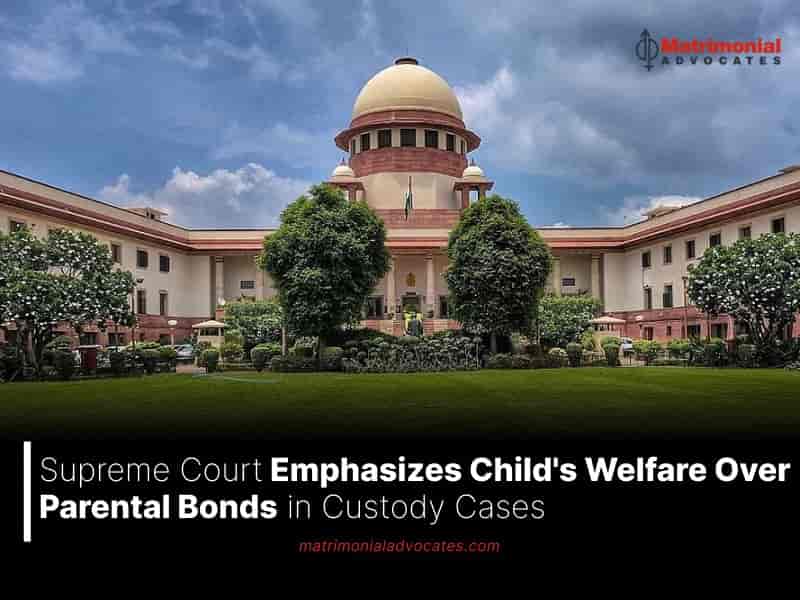
The Supreme Court was considering a matter pertaining to the custody of children.
The Supreme Court reaffirmed that a parent’s genuine love, care, and dedication cannot, by themselves, determine the outcome of a child custody case.
The matter before the Court pertained to a dispute regarding the custody of a child.
The 3-Judge Bench of Justice Vikram Nath, Justice Sanjay Karol and Justice Sandeep Mehta asserted, “There are series of judgments by this Court wherein, it has been authoritatively held that in cases of child custody, the paramount consideration should be the welfare of the child. The utmost sincerity, love and affection showered by either of the parents, by itself, cannot be a ground to decide the custody of a child.”
Factual Background
The appellant and respondent, both accomplished professionals, were married in 2014 and have three children—a son, a daughter, and a younger son born in 2021. Marital differences began surfacing in 2017, eventually leading to their separation, although there were sporadic attempts at reconciliation. During one such attempt in 2021, the appellant conceived their third child. Fearing that the respondent might forcibly take the children from her, the appellant filed a petition under the Guardians and Wards Act, 1890, before the Family Court, seeking permanent custody. The matter remains pending final resolution.
The Family Court passed an order restraining the respondent-father from forcibly removing the minor children from the appellant-mother’s custody. Thereafter, the father moved the court for interim custody and visitation rights, which were granted—permitting him to meet the children on the second Saturday of each month within the court premises. Subsequently, the Kerala High Court, acting on a petition by the father, granted him interim custody. Aggrieved by this decision, the appellant-mother approached the Supreme Court through a special leave petition.
Reasoning
The Bench took note of the mother’s grave concerns regarding the environment in which the daughter was kept during the 15-day interim custody granted to the respondent-father by the High Court. It was also brought to the Court’s attention that the father had not complied with the High Court’s directive to appoint a nanny.
The Bench observed that the interim arrangement outlined by the High Court in the impugned order—providing alternating 15-day custody of both children to each parent—was neither practical nor in the best interest of the children’s mental and physical well-being. It noted that the younger child, a three-year-old son, had scarcely spent time with his father, who resides and works in Singapore. “Thus, directing the custody of the tender aged boy to be assigned to the respondent-father, even on an interim basis for a period of 15 days each month, is grossly unjustified and may have serious adverse effects on the emotional and physical well-being of the child and may create a sense of deep insecurity in the boy owing to forced separation from the mother. The interim arrangement made by the High Court to the extent of the three-year-old son is totally uncalled for and unsustainable on the face of the record and is hereby set aside”, it stated.
While evaluating the interim custody of the eight-year-old daughter granted to the respondent-father, the Bench noted that he was unable to provide her with nutritious, home-cooked meals and instead depended on food from restaurants or hotels. The Court further observed that, due to his professional and personal obligations, it was impractical to expect the father to give the child his undivided attention during the custody period. Consequently, the child was left without adequate companionship or care for extended durations. However, the appellant-mother’s parents reside with her, and she also benefits from the flexibility of working from home. It was further noticed that the younger brother of the girl child is there to provide her healthy company.
“Hence, the emotional and moral support which the child gets at her mother’s home is manifold than what is being provided by the father during the interim custody period. The period of 15 days during which the daughter would be with the father would also lead to deprivation of her company to her sibling, the boy child aged three years.”
The Bench noted that the High Court had made an error in granting the respondent-father interim custody of the children for 15 days each month, observing that “The periodic division of custody is definitely adverse to the well-being; physical, mental and emotional, of the children. In a long run, this arrangement may prove extremely harmful and may cause irreversible mental trauma to both the children.”
Consequently, the Bench allowed the appeal and ordered that the father be granted interim custody of the daughter on alternate Saturdays and Sundays each month. The Bench also ordered, “On either of these two days, the respondent father will be entitled to meet and have interim custody of the boy child for a period of four hours subject to the comfort of the child. This period of four hours interim custody of the boy shall be supervised by a child counsellor, who is to be engaged by the respondent father with prior approval of the family Court.”





